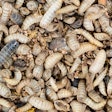
COVID-19 has lowered demand for protein in the region, with the exception of poultry in Vietnam
In Southeast Asia, as a result of the novel coronavirus (COVID-19) pandemic, demand for animal feed is expected to decline due to the reduction in animal protein consumption, according to Rabobank.
In a recent report, Rabobank said demand for grains and oilseeds in the region would decline, and beef consumption in 2020 will fall by 9% to 13%, while pork consumption will drop 4% to 17% year over year (YOY). Poultry consumption is expected to decline 1% to 4% in Indonesia, Malaysia, Thailand and the Philippines, but is expected to grow 4% in Vietnam. Fish demand in Southeast Asia is forecast to fall 6% to 11%.
“We estimate demand for wheat, corn, soybean, and soymeal for animal feed in Indonesia, Malaysia, the Philippines, Thailand and Vietnam to reduce by 6% YOY in 2020,” the report said. “Around 35% of total annual wheat, corn, soybean and soymeal demand in these five countries is used for food consumption, while the remaining 65% is used for animal feed. … We estimate total wheat, corn, soybean and soymeal demand in these five countries will reduce by 3% YOY in 2020.”
As in other regions of the world, closure of foodservice outlets has led to a significant drop in dairy sales. However, the report said, ecommerce is up substantially. Milk powder product imports are estimated to fall nearly 8% this year.
Rabobank said lockdowns in Southeast Asia have resulted in GDP slowdown, capital outflow, weak currencies, job losses and overall weaker consumer confidence.
“We expect more negative economic impacts to come in terms of global recession and global decline for Southeast Asian export economies,” the report said. “We also expect supply chains to be significantly disrupted across Southeast Asian (food and agriculture) sectors as a result of reduced demand, absent workforce and interruptions in production, trade and logistics.”








